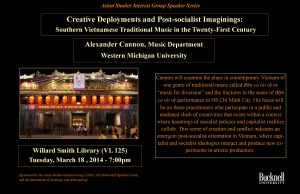Traditional music creation in contemporary Vietnam borders on the frenetic. Music practitioners and consumers involve themselves in many different performance types within Vietnam, in Asia and among communities of Vietnamese in diaspora. Traveling from Long Xuyên to Hồ Chí Minh City and then flying to Bangkok, Taipei and Kiev, musicians interact with a greater number of musical types, media and ideas than in previous decades. In the process, certain memories of the past fade and conflict with those held by others, forcing delicate negotiations of so-called “authentic” and appropriately “developed” performance practices. New communities sprout to make sense of these memories and practices; oftentimes, adept or “charismatic” individuals lead the negotiation process. These leaders solidify knowledge and understanding within new communities in southern Vietnam, in diaspora and among virtual communities comprised of in- and out-of-country Vietnamese who work to sustain creative musical practices. In this paper, I examine the place in contemporary Vietnam of one genre of traditional music called đờn ca tài tử or “music for diversion” and the fractures in the scene of đờn ca tài tử performance in Hồ Chí Minh City. I focus on those practitioners who participate in a public and mediated clash of creativities that exists within a context where hauntings of socialist policies and capitalist realities collide. This scene of creation and conflict indicates an emergent post-socialist orientation in Vietnam, where capitalist and socialist ideologies interact and produce new experiments in artistic production. I argue ultimately that the coexistence of these disparate outputs within the post-socialist context appears imperative to sustaining communities of music performers.
